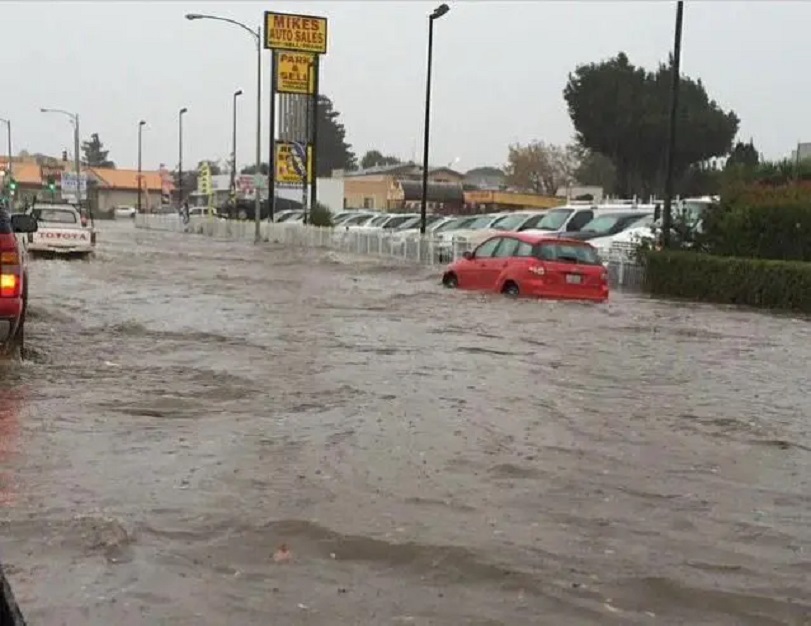By Adedapo Adesanya
The federal government has cautioned that 148 Local Government Areas (LGAs) across 31 states are among the highly probable flood-risk areas for 2024.
The warning was issued by the Minister of Water Resources and Sanitation, Mr Joseph Utsev, during the official unveiling of the 2024 Annual Flood Outlook (AFO) themed Promoting the Use of Data Analytics and Modeling for Flood Risk Assessments and Food Security through the Nigeria Hydrological Services Agency (NIHSA) which leads AFO yearly predictions.
The identified states are Adamawa, Akwa-Ibom, Anambra, Bauchi, Bayelsa, Benue, Borno, Cross-River, Delta, Ebonyi, Edo, Imo, Jigawa, Kaduna, Kano, Katsina, Kebbi and Kogi.
Others are Kwara, Lagos, Nasarawa, Niger, Ogun, Ondo, Osun, Oyo, Plateau, Rivers, Sokoto, Taraba, and Yobe.
Mr Utsev emphasised the importance of proactive measures to mitigate potential flood impacts in these areas, saying there was a need for preparedness, early warning systems, and community engagement to minimise damage to lives and property.
The Minister said that the high flood-risk areas spanned from April to November 2024; with potential impacts on population, agriculture, livelihoods, livestock, infrastructure, and the environment.
He highlighted the theme’s alignment with the Presidential Agenda on Food Security as it was central to the current administration’s goal of lifting millions of Nigerians out of poverty and advancing towards national prosperity.
Mr Utsev said Nigeria had faced recurrent and severe flood disasters over the years, with 2012 marked as one of the most devastating recorded events.
“The 2022 floods were particularly catastrophic, being termed the worst in the country’s history in terms of impact magnitude.
“The World Bank estimated the total economic damage from the 2022 floods, including damage to residential and nonresidential buildings, infrastructure, productive sectors, and farmlands, at approximately 6.68 billion dollars.
“In response to the ongoing challenges posed by flooding, President Bola Tinubu initiated the National Economic Council Ad-hoc Committee on Flood Mitigation, Adaptation, Preparedness, and Response,’’ he said.
The minister said the committee’s mandate was to proactively develop a comprehensive roadmap aimed at enhancing Nigeria’s flood mitigation, preparedness, adaptation, and communication infrastructure.
On his part, Mr Charles Anosike, Director General of the Nigerian Meteorological Agency (NIMET), said that the partnership between NIHSA and the agency was pivotal in enhancing the nation’s disaster preparedness.
He said that the collaboration had notably improved efforts in mitigating the impact of flooding through early warning systems.
According to him, it is a critical initiative aimed at addressing the escalating frequency and severity of flooding incidents across the country.
He underscored the imperative of leveraging data, analytics, and modelling in flood risk assessment and management, citing NIMET’s commitment to providing comprehensive meteorological insights for informed decision-making.
Referencing a UNICEF report on the extensive damage inflicted by flooding on agricultural lands in the previous year, he stressed the urgency of integrating forecast information into national policies and interventions.
He reaffirmed NIMET’s dedication to collaborating with NIHSA and other stakeholders to deliver timely and accurate weather forecasts tailored to meet the diverse needs of communities nationwide.
Adding his input, Mrs Zubaida Umar, the Director General of the National Emergency Management Agency (NEMA), underscored the significance of the AFO released by NIHSA.
Mrs Umar noted the increasing prevalence of flooding in Nigeria and its devastating consequences, including loss of lives, property damage, displacement, and disruption of livelihoods.
She stressed the urgent need for proactive measures to mitigate the impact of flooding across the country.
Mrs Umar commended the AFO as a crucial tool for informed decision-making and action to enhance the nation’s preparedness for floods, noting the longstanding partnership between NEMA and NIHSA in flood risk management.
She said that NEMA relied on the AFO to develop its annual Climate Related Hazard preparedness and response strategy, which served as an early warning message for Nigeria.





























